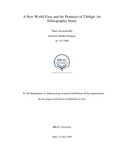A new world view and the promises of Tabligh: an ethnographic study

View/Open
Date
2019-07Publisher
Brac UniversityAuthor
Rahman, Riedwan HabiburMetadata
Show full item recordAbstract
The Tablighi Jamaat is a self-proclaimed non-political, transnational Islamic reform movement which was initiated in India in the 1920's. The founder of the Tablighi Jamaat, Moulana Muhammad Ilyas (1885-1944), founded the Tablighi movement in India with a desire to make the Muslims of that time into “true Muslims”. The word 'Tabligh' means the transmission of a message, and the word 'Jamaat' means a group of people. The focus of this movement is to invite and communicate with people to improve their faith. This movement is solely focused to preach the true idea of Islam among the Muslim community, it does not preach outside of the Muslim population. In Bangladesh, the movement has a following of millions.
Preaching is one of the core concepts of this movement. The main goal of this movement is to establish a spiritual closeness with Allah. Which can be obtained by preaching. Thus, it is an integral part of the movement. The preaching journey includes both activities with other people in one’s own locality and missionary journeys to other places. One must take part in preaching campaign. The campaigns has different time span. One must go for a 3 day campaign every month, on a 40 day campaign every year, and a 4 months campaign once in their lifetime.
The focus of my thesis would be to provide an ethnographical account of the preaching method of Tablighi Jamaat. The paper is designed to give an overview of the life of an active Tablighi Jamaat member, at the same time provide an insight into what propelled them to join this movement.
